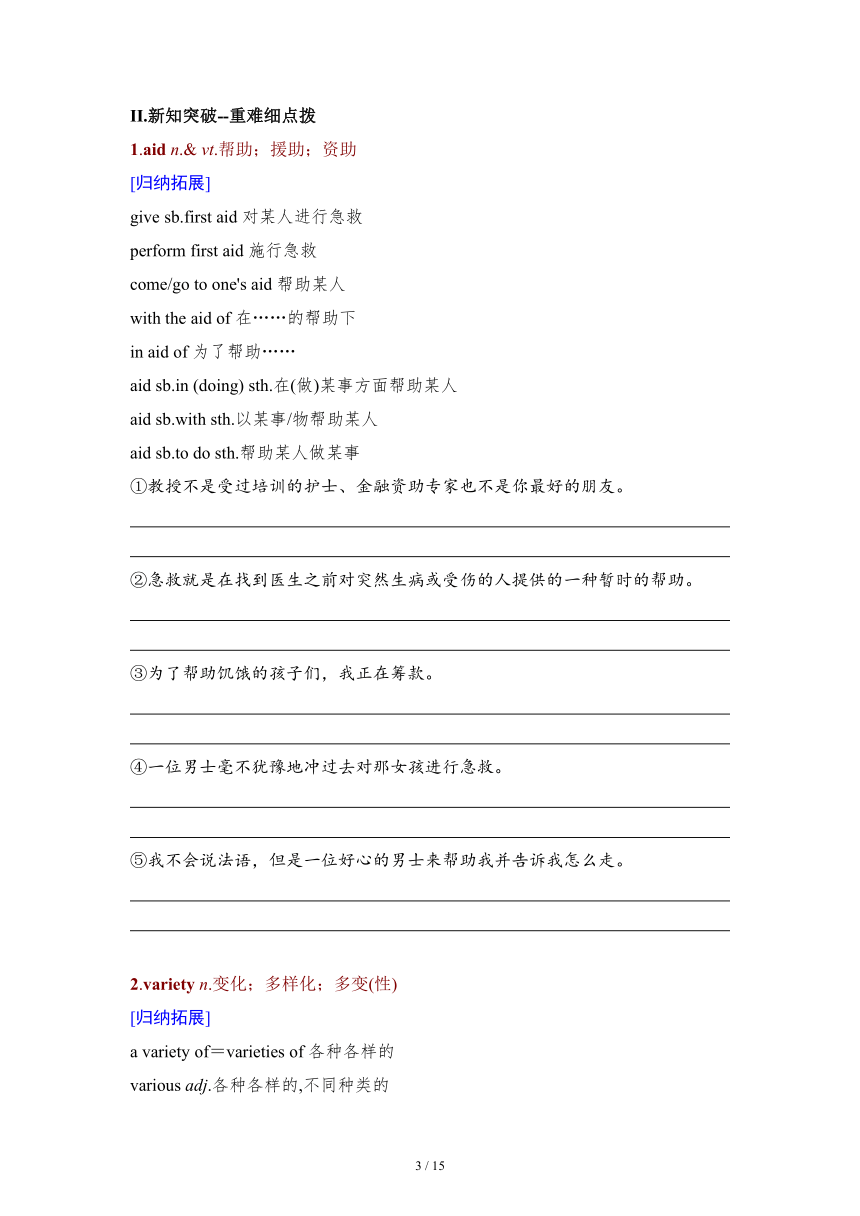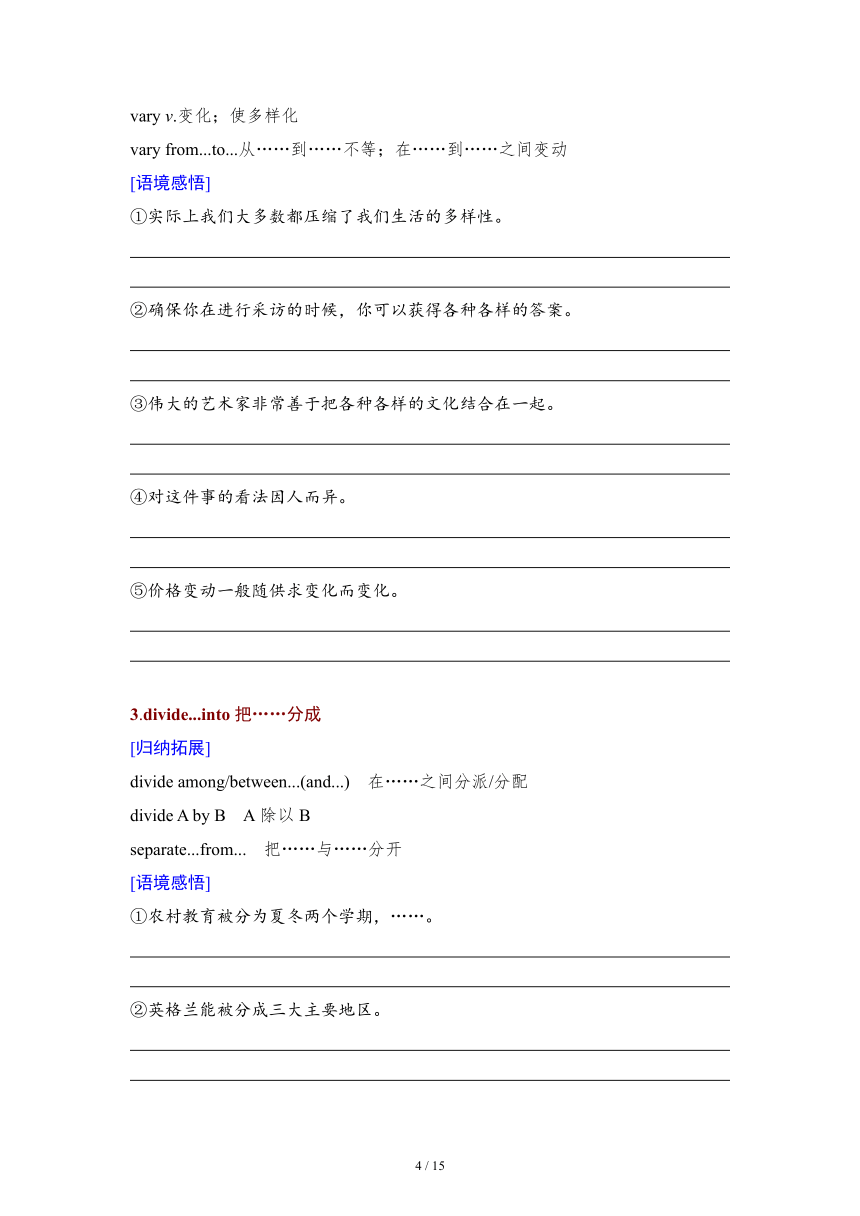人教版(2019)选择性必修第二册Unit 5 First Aid 同步学案(无答案)
文档属性
| 名称 | 人教版(2019)选择性必修第二册Unit 5 First Aid 同步学案(无答案) |

|
|
| 格式 | zip | ||
| 文件大小 | 158.7KB | ||
| 资源类型 | 教案 | ||
| 版本资源 | 人教版(2019) | ||
| 科目 | 英语 | ||
| 更新时间 | 2022-02-22 19:40:57 | ||
图片预览





文档简介
英语 学科高中同步讲义 选择性必修第二册
(2019 人教新课标)
Unit 05 First Aid
Section Ⅰ-Listening and Speaking
I.阅读积累:
After a quiz last autumn, Kuang crossed the continent eastward to Toronto to visit his schoolmate, the distance measuring approximately 5,000 kilometers,
His train started from Vancouver, a city surrounded by mountains. After confirming his baggage was aboard the train, Kuang settled down in his seat. Having a gift for communication, he started chatting with another passenger within 5 minutes. Their topics included the Canadian traditions, the Prime Minister, the mixture of races, and the terrifying Great Fall. After a nice buffet at noon, he was pleased to find that the scenery was impressive. He saw beautiful harbours in the distance, wealthy urban areas and maple forest that covered thousands of acres. He even managed to catch sight of an eagle flying upward over bushes.
Kuang reached Toronto which lies slightly near the border at a misty dawn. There was frost and the broad downtown streets were very quiet. Though it was early, Kuang phoned his schoolmate in a booth nearby at once rather than waiting for him to come. They had a good time together.
Section Ⅱ Reading and Thinking
I.英中翻译:
1.As you can imagine, getting burnt can lead to very serious injuries.
2.Remove any clothes using scissors if necessary, unless you see the fabric sticking to the burnt skin.
3.However, it was several months before her ankle recovered....
4.It is important to have a knowledge of first aid in daily life.
5.Knowing how to respond properly can make a big difference.
6.Here are some rules that you can follow.
7.Don't hesitate to start his/her breathing using the mouth to mouth technique.
8.It often happens that a boy or a girl is drowning,especially in hot summer.
II.新知突破--重难细点拨
1.aid n.& vt.帮助;援助;资助
[归纳拓展]
give sb.first aid对某人进行急救
perform first aid施行急救
come/go to one's aid帮助某人
with the aid of在……的帮助下
in aid of为了帮助……
aid sb.in (doing) sth.在(做)某事方面帮助某人
aid sb.with sth.以某事/物帮助某人
aid sb.to do sth.帮助某人做某事
①教授不是受过培训的护士、金融资助专家也不是你最好的朋友。
②急救就是在找到医生之前对突然生病或受伤的人提供的一种暂时的帮助。
③为了帮助饥饿的孩子们,我正在筹款。
④一位男士毫不犹豫地冲过去对那女孩进行急救。
⑤我不会说法语,但是一位好心的男士来帮助我并告诉我怎么走。
2.variety n.变化;多样化;多变(性)
[归纳拓展]
a variety of=varieties of各种各样的
various adj.各种各样的,不同种类的
vary v.变化;使多样化
vary from...to...从……到……不等;在……到……之间变动
[语境感悟]
①实际上我们大多数都压缩了我们生活的多样性。
②确保你在进行采访的时候,你可以获得各种各样的答案。
③伟大的艺术家非常善于把各种各样的文化结合在一起。
④对这件事的看法因人而异。
⑤价格变动一般随供求变化而变化。
3.divide...into把……分成
[归纳拓展]
divide among/between...(and...) 在……之间分派/分配
divide A by B A除以B
separate...from... 把……与……分开
[语境感悟]
①农村教育被分为夏冬两个学期,……。
②英格兰能被分成三大主要地区。
③Hannah's Place被划分成几个区域。当天气很冷在室外睡觉就意味着死亡时,为人们提供遮蔽寒冷的地方。
④因为工作可以由几个人共同分担,所以可以做得很有效率。
⑤如果你用二十除以四,那么商是五。
⑥请把坏苹果和好苹果分开。
[巧学助记] 形象区分divide与separate
4.stick (stuck,stuck) v.伸,伸出,刺入;粘贴;陷入;n.枝条,棍,手杖
[归纳拓展]
be/get stuck in被困在……
stick out(把……)坚持到底;突出,显眼
stick up竖立
stick with持续;坚持
stick to坚持,粘住
[语境感悟]
①在今天的科学课上,有个学生的手指被卡在试管里。
②卡片在往信箱里投时被卡住了。
③他一旦许下诺言,就会坚守。
5.urgent adj.紧急的,急迫的,急切的
[归纳拓展]
urgently adv.急切地,急需地
urgency n.紧迫(的事情),紧急(状况)
urge v.力劝,催促;竭力主张
urge sb.to do sth.力劝某人做某事
urge sth.竭力主张
urge that...(should do)敦促……
[语境感悟]
①医生夜里三次被叫醒去看急诊病人。
②那病人应该马上送医院。
③形势急需大家采取防护措施。
6.ease n.安逸;舒适;vt.减轻(痛苦,忧患)
[归纳拓展]
at ease舒适;快活;自由自在
with ease轻易地;毫不费力地
ease the pain/pressure减轻疼痛/压力
easy adj.轻松的;安逸的;容易的
①每天穿着校服,我们感到自在。
②家庭作业很容易做。
③散步有助于减轻他的疼痛。
7.treatment n.对待,治疗
[归纳拓展]
treat sb.well/badly善待/虐待某人
treat...as/like当成……来对待……
treat sb.to...请某人……,款待某人……
This is/It's one's treat.某人请客.
treat v.对待,治疗
[语境感悟]
①这种治疗无疼痛。
②宾馆给那些常客特殊待遇。
③约翰用这些东西处理斯莱德女士手上最严重的伤口。
④认为政府会接管无人驾驶汽车,并接受它们作为公共交通工具的想法在这里根本就不现实。
[易混辨析]
treat “治疗”。含义最广,指通过药物、特别的食品或运动治疗病人,强调治疗过程
cure “治疗,治愈”。多指病后的恢复健康,其后可接表示疾病的名词或代词,多用于短语cure sb.of;还可作“矫正,纠正”解,表示消除社会上的不良现象或个人恶习
8.contact vt.联络;联系;n.联系;接触
[归纳拓展]
make contact with=get/come in/into contact with与……取得联系
lose contact with与……失去联系
keep in contact with 与……保持联系
be in/out of contact with与……有/没有联系
[语境感悟]
①如果你能提供一些帮助我将万分感激,请联系我……。
②想要更多关于到秘鲁包价旅游的资料手册,请访问tourinfo@travelperu.org。
③你毕业后和同学们还保持联系吗?
④我已经与大部分校友失去了联系。
9.operator n.操作员,电话接线员
[归纳拓展]
operate on给……动手术
come/go into operation开始运转,开始生效
bring/put into operation实施,使生效,使运行
[语境感悟]
①八月份开始的这项活动将在南非进行。
②有谁知道怎么操作这个系统吗?
③医生们将要对他的中枢神经系统动手术。
④新法律于明日午夜生效。
10.delay n.耽误;耽搁;v.推迟,延期
[归纳拓展]
delay sth.延迟某事
delay doing sth.推迟做某事
delay sb.使迟到,使耽搁;使拖延
[语境感悟]
①我马上给她打电话表达谢意。
②我乘坐的航班因为大雨而延误了。
③他不得不推迟有关考试成绩的报告。
11.vital adj.至关重要的;生死攸关的
[归纳拓展]
be vital to/for对……很重要
It is vital to do sth.做某事很重要
It is vital that...重要的是……(从句谓语动词要用should+动词原形,should可以省略)
[语境感悟]
①了解历史对于了解我们自己非常重要。
②如果是二度或者三度烧伤,至关重要的是把伤员立刻送去看医生或者送往医院。
③虽然这些措施不是长期有效,但对当前来说,它们很重要。
④重要的是,我们学生要养成适合自己的学习习惯。
12.poison n.毒药;毒害;vt.毒害,使中毒
[归纳拓展]
poisonous adj.有毒的
poisoned adj.中毒的,中过毒的
[语境感悟]
①有些蘑菇含有致命毒素。
②汽车引擎排放的汽油烟气毒化着大气。
③电子垃圾也含有很多有毒的金属。
Section Ⅲ Discovering Useful Structures -现在分词和动名词
一、概述
现在分词( ing分词)和动名词是非谓语动词形式,从语法功能上分析,现在分词兼有动词、形容词或副词特性,可在句中充当定语、状语、表语和宾语补足语。现在分词通常与其逻辑主语之间存在着主谓关系。动名词具有名词的特性,在句中可充当主语、宾语和表语。其构成形式如下:
主动语态 被动语态 否定式
一般式 doing being done not doing / not being done
完成式 having done having been done not having done / not having been done
二、分类精讲
Ⅰ.作表语
1.作表语的动名词所体现的是名词的特性,用于对主语的内容进行解释说明,可表示抽象或习惯上的动作,且主语和表语可以换位。
*His job is guiding the gate for the company.他的工作是为这家公司看守大门。
*His hobby is reading books in his spare time.他的爱好是在业余时间里读书。
2.作表语的现在分词是形容词性的,表示主语的性质或特征,这时通常看作是形容词,且主语与表语不可换位。
*His performance is very entertaining,which brings us much pleasure.他的表演是非常有趣的,给我们带来很多乐趣。
*The trip is very exciting,and we have decided to have a similar one.这次旅行很是激动人心,我们已决定再进行一次类似的旅行。
[即学活用]
完成句子
①他的工作很无趣,但是他需要依靠它来养活自己。
His job____________,but he has to depend on it to support himself.
②让他不高兴的是他把他最喜欢的自行车丢了。
What has made him unhappy is________________.
③这朵花看起来很迷人。
The flower______________.
Ⅱ.作定语
动名词作定语表示名词的属性或事物的用途时,一般只能作前置定语,此时意为“供作………之用”,与被修饰词之间没有逻辑上的主谓关系,在意义上相当于“名词+for+doing”。
The baby is sleeping in a sleeping bag (=a bag for sleeping).(表示用途)这个婴儿正在睡袋里睡觉。
There is a swimming pool(=a pool for swimming)in our school.(表示用途)我们学校有一个游泳池。
现在分词作定语时可表示所修饰的名词的动作或状态,相当于一个定语从句。 单个动词 ing形式直接置于名词前,动词 ing短语应放在名词之后。
*The boy playing football on the playground is my younger brother.=The boy that/who is playing football on the playground is my younger brother.在操场上踢足球的那个男孩是我的弟弟。
*The foreigner standing under the tree is from Britain.
=The foreigner who is standing under the tree is from Britain.正站在树下的那个外国人来自英国。
[即学活用]
句型转化
①The girl standing there is my classmate.(改为定语从句)
→The girl______________is my classmate.
②He saw a flying bird.(改为定语从句)
→He saw a bird__________________.
语法填空
③Those________(wish) to join the club should sign here.
④The topic______________(discuss) has drawn some experts'attention.
Ⅲ.作宾语补足语
1.动名词位于感官动词后(see,hear,feel,smell,watch,find,notice等)。
When he passed the swimming pool,he saw someone swimming in it.当他经过游泳池时,他看见有人在游泳。
I felt someone patting me on the shoulder.我感觉有人在拍我的肩膀。
2.现在分词位于使役动词后(have,leave,get,keep,set,catch等)。
She couldn't have him getting away with telling lies.她不能容忍他撤了谎不受惩罚。
Don’t keep the little boy staying alone.不要让这个小男孩独自待着。
3.用于with复合结构中
With time going on,we will have a better and better life.随着时间的流逝,我们会过上越来越好的生活。
*With so many people looking at her,she felt nervous.这么多人看着她,她感到很紧张。
[即学活用]
完成句子
①随着时间的流逝,他对数学越来越感兴趣。
________________,he becomes more and more interested in math.(with)
②我无法让钟表走起来了。
I can't get the clock______________.
③我们看到老师在做实验。
We saw the teacher______________.
Ⅳ.作状语
1.作时间状语。
Hearing the news,he couldn’t help laughing.一听到那个消息,他禁不住大笑起来。
2.作原因状语。
Being poor,he couldn’t afford a TV set.因为穷,他买不起电视机。
3.作条件状语。
Working hard,you'll surely succeed.=If you work hard,you’ll surely succeed.如果努力工作,你就一定会成功。
4.作结果状语。
The child slipped and fell, hitting his head against the door.那男孩滑了一跤,头撞到了门上。
5.作让步状语。
*Having been told many times, he still didn't learn these rules by heart.尽管被告知了很多次,他还是没把这些规定记住。
6.作伴随状语。
The boy sat in front of the farm house, cutting the branches.那个男孩坐在农舍前砍树枝。
7.作方式状语。
*He came running back to tell me the news.他跑回来告诉我这个消息。
[即学活用]
语法填空
①Newly build wooden cottages line the street,________(turn) the old town into a dreamland.
②The cooling wind swept through our bedroom windows,________(make) air conditioning unnecessary.
③____________(spend) the past year as an exchange student in Hong Kong,Linda appears more mature than those of her age.
(2019 人教新课标)
Unit 05 First Aid
Section Ⅰ-Listening and Speaking
I.阅读积累:
After a quiz last autumn, Kuang crossed the continent eastward to Toronto to visit his schoolmate, the distance measuring approximately 5,000 kilometers,
His train started from Vancouver, a city surrounded by mountains. After confirming his baggage was aboard the train, Kuang settled down in his seat. Having a gift for communication, he started chatting with another passenger within 5 minutes. Their topics included the Canadian traditions, the Prime Minister, the mixture of races, and the terrifying Great Fall. After a nice buffet at noon, he was pleased to find that the scenery was impressive. He saw beautiful harbours in the distance, wealthy urban areas and maple forest that covered thousands of acres. He even managed to catch sight of an eagle flying upward over bushes.
Kuang reached Toronto which lies slightly near the border at a misty dawn. There was frost and the broad downtown streets were very quiet. Though it was early, Kuang phoned his schoolmate in a booth nearby at once rather than waiting for him to come. They had a good time together.
Section Ⅱ Reading and Thinking
I.英中翻译:
1.As you can imagine, getting burnt can lead to very serious injuries.
2.Remove any clothes using scissors if necessary, unless you see the fabric sticking to the burnt skin.
3.However, it was several months before her ankle recovered....
4.It is important to have a knowledge of first aid in daily life.
5.Knowing how to respond properly can make a big difference.
6.Here are some rules that you can follow.
7.Don't hesitate to start his/her breathing using the mouth to mouth technique.
8.It often happens that a boy or a girl is drowning,especially in hot summer.
II.新知突破--重难细点拨
1.aid n.& vt.帮助;援助;资助
[归纳拓展]
give sb.first aid对某人进行急救
perform first aid施行急救
come/go to one's aid帮助某人
with the aid of在……的帮助下
in aid of为了帮助……
aid sb.in (doing) sth.在(做)某事方面帮助某人
aid sb.with sth.以某事/物帮助某人
aid sb.to do sth.帮助某人做某事
①教授不是受过培训的护士、金融资助专家也不是你最好的朋友。
②急救就是在找到医生之前对突然生病或受伤的人提供的一种暂时的帮助。
③为了帮助饥饿的孩子们,我正在筹款。
④一位男士毫不犹豫地冲过去对那女孩进行急救。
⑤我不会说法语,但是一位好心的男士来帮助我并告诉我怎么走。
2.variety n.变化;多样化;多变(性)
[归纳拓展]
a variety of=varieties of各种各样的
various adj.各种各样的,不同种类的
vary v.变化;使多样化
vary from...to...从……到……不等;在……到……之间变动
[语境感悟]
①实际上我们大多数都压缩了我们生活的多样性。
②确保你在进行采访的时候,你可以获得各种各样的答案。
③伟大的艺术家非常善于把各种各样的文化结合在一起。
④对这件事的看法因人而异。
⑤价格变动一般随供求变化而变化。
3.divide...into把……分成
[归纳拓展]
divide among/between...(and...) 在……之间分派/分配
divide A by B A除以B
separate...from... 把……与……分开
[语境感悟]
①农村教育被分为夏冬两个学期,……。
②英格兰能被分成三大主要地区。
③Hannah's Place被划分成几个区域。当天气很冷在室外睡觉就意味着死亡时,为人们提供遮蔽寒冷的地方。
④因为工作可以由几个人共同分担,所以可以做得很有效率。
⑤如果你用二十除以四,那么商是五。
⑥请把坏苹果和好苹果分开。
[巧学助记] 形象区分divide与separate
4.stick (stuck,stuck) v.伸,伸出,刺入;粘贴;陷入;n.枝条,棍,手杖
[归纳拓展]
be/get stuck in被困在……
stick out(把……)坚持到底;突出,显眼
stick up竖立
stick with持续;坚持
stick to坚持,粘住
[语境感悟]
①在今天的科学课上,有个学生的手指被卡在试管里。
②卡片在往信箱里投时被卡住了。
③他一旦许下诺言,就会坚守。
5.urgent adj.紧急的,急迫的,急切的
[归纳拓展]
urgently adv.急切地,急需地
urgency n.紧迫(的事情),紧急(状况)
urge v.力劝,催促;竭力主张
urge sb.to do sth.力劝某人做某事
urge sth.竭力主张
urge that...(should do)敦促……
[语境感悟]
①医生夜里三次被叫醒去看急诊病人。
②那病人应该马上送医院。
③形势急需大家采取防护措施。
6.ease n.安逸;舒适;vt.减轻(痛苦,忧患)
[归纳拓展]
at ease舒适;快活;自由自在
with ease轻易地;毫不费力地
ease the pain/pressure减轻疼痛/压力
easy adj.轻松的;安逸的;容易的
①每天穿着校服,我们感到自在。
②家庭作业很容易做。
③散步有助于减轻他的疼痛。
7.treatment n.对待,治疗
[归纳拓展]
treat sb.well/badly善待/虐待某人
treat...as/like当成……来对待……
treat sb.to...请某人……,款待某人……
This is/It's one's treat.某人请客.
treat v.对待,治疗
[语境感悟]
①这种治疗无疼痛。
②宾馆给那些常客特殊待遇。
③约翰用这些东西处理斯莱德女士手上最严重的伤口。
④认为政府会接管无人驾驶汽车,并接受它们作为公共交通工具的想法在这里根本就不现实。
[易混辨析]
treat “治疗”。含义最广,指通过药物、特别的食品或运动治疗病人,强调治疗过程
cure “治疗,治愈”。多指病后的恢复健康,其后可接表示疾病的名词或代词,多用于短语cure sb.of;还可作“矫正,纠正”解,表示消除社会上的不良现象或个人恶习
8.contact vt.联络;联系;n.联系;接触
[归纳拓展]
make contact with=get/come in/into contact with与……取得联系
lose contact with与……失去联系
keep in contact with 与……保持联系
be in/out of contact with与……有/没有联系
[语境感悟]
①如果你能提供一些帮助我将万分感激,请联系我……。
②想要更多关于到秘鲁包价旅游的资料手册,请访问tourinfo@travelperu.org。
③你毕业后和同学们还保持联系吗?
④我已经与大部分校友失去了联系。
9.operator n.操作员,电话接线员
[归纳拓展]
operate on给……动手术
come/go into operation开始运转,开始生效
bring/put into operation实施,使生效,使运行
[语境感悟]
①八月份开始的这项活动将在南非进行。
②有谁知道怎么操作这个系统吗?
③医生们将要对他的中枢神经系统动手术。
④新法律于明日午夜生效。
10.delay n.耽误;耽搁;v.推迟,延期
[归纳拓展]
delay sth.延迟某事
delay doing sth.推迟做某事
delay sb.使迟到,使耽搁;使拖延
[语境感悟]
①我马上给她打电话表达谢意。
②我乘坐的航班因为大雨而延误了。
③他不得不推迟有关考试成绩的报告。
11.vital adj.至关重要的;生死攸关的
[归纳拓展]
be vital to/for对……很重要
It is vital to do sth.做某事很重要
It is vital that...重要的是……(从句谓语动词要用should+动词原形,should可以省略)
[语境感悟]
①了解历史对于了解我们自己非常重要。
②如果是二度或者三度烧伤,至关重要的是把伤员立刻送去看医生或者送往医院。
③虽然这些措施不是长期有效,但对当前来说,它们很重要。
④重要的是,我们学生要养成适合自己的学习习惯。
12.poison n.毒药;毒害;vt.毒害,使中毒
[归纳拓展]
poisonous adj.有毒的
poisoned adj.中毒的,中过毒的
[语境感悟]
①有些蘑菇含有致命毒素。
②汽车引擎排放的汽油烟气毒化着大气。
③电子垃圾也含有很多有毒的金属。
Section Ⅲ Discovering Useful Structures -现在分词和动名词
一、概述
现在分词( ing分词)和动名词是非谓语动词形式,从语法功能上分析,现在分词兼有动词、形容词或副词特性,可在句中充当定语、状语、表语和宾语补足语。现在分词通常与其逻辑主语之间存在着主谓关系。动名词具有名词的特性,在句中可充当主语、宾语和表语。其构成形式如下:
主动语态 被动语态 否定式
一般式 doing being done not doing / not being done
完成式 having done having been done not having done / not having been done
二、分类精讲
Ⅰ.作表语
1.作表语的动名词所体现的是名词的特性,用于对主语的内容进行解释说明,可表示抽象或习惯上的动作,且主语和表语可以换位。
*His job is guiding the gate for the company.他的工作是为这家公司看守大门。
*His hobby is reading books in his spare time.他的爱好是在业余时间里读书。
2.作表语的现在分词是形容词性的,表示主语的性质或特征,这时通常看作是形容词,且主语与表语不可换位。
*His performance is very entertaining,which brings us much pleasure.他的表演是非常有趣的,给我们带来很多乐趣。
*The trip is very exciting,and we have decided to have a similar one.这次旅行很是激动人心,我们已决定再进行一次类似的旅行。
[即学活用]
完成句子
①他的工作很无趣,但是他需要依靠它来养活自己。
His job____________,but he has to depend on it to support himself.
②让他不高兴的是他把他最喜欢的自行车丢了。
What has made him unhappy is________________.
③这朵花看起来很迷人。
The flower______________.
Ⅱ.作定语
动名词作定语表示名词的属性或事物的用途时,一般只能作前置定语,此时意为“供作………之用”,与被修饰词之间没有逻辑上的主谓关系,在意义上相当于“名词+for+doing”。
The baby is sleeping in a sleeping bag (=a bag for sleeping).(表示用途)这个婴儿正在睡袋里睡觉。
There is a swimming pool(=a pool for swimming)in our school.(表示用途)我们学校有一个游泳池。
现在分词作定语时可表示所修饰的名词的动作或状态,相当于一个定语从句。 单个动词 ing形式直接置于名词前,动词 ing短语应放在名词之后。
*The boy playing football on the playground is my younger brother.=The boy that/who is playing football on the playground is my younger brother.在操场上踢足球的那个男孩是我的弟弟。
*The foreigner standing under the tree is from Britain.
=The foreigner who is standing under the tree is from Britain.正站在树下的那个外国人来自英国。
[即学活用]
句型转化
①The girl standing there is my classmate.(改为定语从句)
→The girl______________is my classmate.
②He saw a flying bird.(改为定语从句)
→He saw a bird__________________.
语法填空
③Those________(wish) to join the club should sign here.
④The topic______________(discuss) has drawn some experts'attention.
Ⅲ.作宾语补足语
1.动名词位于感官动词后(see,hear,feel,smell,watch,find,notice等)。
When he passed the swimming pool,he saw someone swimming in it.当他经过游泳池时,他看见有人在游泳。
I felt someone patting me on the shoulder.我感觉有人在拍我的肩膀。
2.现在分词位于使役动词后(have,leave,get,keep,set,catch等)。
She couldn't have him getting away with telling lies.她不能容忍他撤了谎不受惩罚。
Don’t keep the little boy staying alone.不要让这个小男孩独自待着。
3.用于with复合结构中
With time going on,we will have a better and better life.随着时间的流逝,我们会过上越来越好的生活。
*With so many people looking at her,she felt nervous.这么多人看着她,她感到很紧张。
[即学活用]
完成句子
①随着时间的流逝,他对数学越来越感兴趣。
________________,he becomes more and more interested in math.(with)
②我无法让钟表走起来了。
I can't get the clock______________.
③我们看到老师在做实验。
We saw the teacher______________.
Ⅳ.作状语
1.作时间状语。
Hearing the news,he couldn’t help laughing.一听到那个消息,他禁不住大笑起来。
2.作原因状语。
Being poor,he couldn’t afford a TV set.因为穷,他买不起电视机。
3.作条件状语。
Working hard,you'll surely succeed.=If you work hard,you’ll surely succeed.如果努力工作,你就一定会成功。
4.作结果状语。
The child slipped and fell, hitting his head against the door.那男孩滑了一跤,头撞到了门上。
5.作让步状语。
*Having been told many times, he still didn't learn these rules by heart.尽管被告知了很多次,他还是没把这些规定记住。
6.作伴随状语。
The boy sat in front of the farm house, cutting the branches.那个男孩坐在农舍前砍树枝。
7.作方式状语。
*He came running back to tell me the news.他跑回来告诉我这个消息。
[即学活用]
语法填空
①Newly build wooden cottages line the street,________(turn) the old town into a dreamland.
②The cooling wind swept through our bedroom windows,________(make) air conditioning unnecessary.
③____________(spend) the past year as an exchange student in Hong Kong,Linda appears more mature than those of her age.
